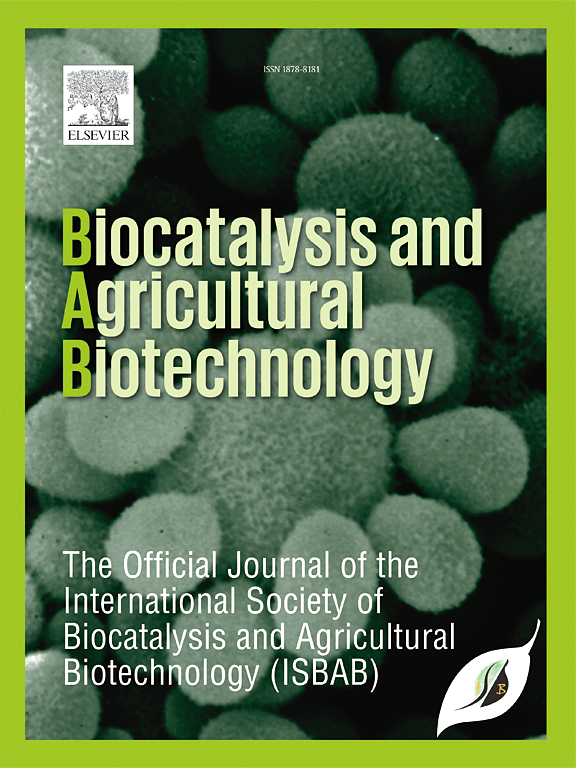Sodium alginate improves phytase stability and enhances soil phosphorous utilization
IF 3.4
Q2 BIOTECHNOLOGY & APPLIED MICROBIOLOGY
引用次数: 0
Abstract
A plant growth-promoting endophytic strain Bacillus sp. WR11 produces high-level phytase. Phytase degrades phytate, which is the major form of organic phosphate in soils that cannot be readily utilized by plants. To strengthen the strain or its phytase for cost-efficient biodegradation of phytate, we compared the impacts of different chemical additives on phytase production and preservation. Phytate degradation ability in soils and growth promotion effect in wheat were evaluated. To ensure safe application, potential pathogenicity of the strain was also predicted. Phytase activity assay suggests that sodium alginate (SA) significantly improves phytase production to as higher as 2.21-fold, but has little influence on the growth of WR11 during liquid fermentation. During liquid storage of cell-free supernatant (CFS) at room temperature, SA maintains 68% phytase activity indicating significantly improved stability within four weeks. Determination of water-soluble P and phytate-P indicates Bacillus sp. WR11 and CFS effectively degrade 20.17–38.55% phytate in soils. Quantification of biomass, phosphorus and iron contents shows positive effect of WR11 and its CFS on wheat growth. Particularly, the degradation ability (63.2%) and growth promoting effect of CFS is much stronger in the presence of 0.8% SA. Genomic prediction demonstrates strain WR11 has a large number of genes in the databases of Pathogen-Host Interactions, Virulence Factors of pathogenic bacteria, Antibiotic Resistance Genes, and the Comprehensive Antibiotic Research Database, respectively. In conclusion, SA significantly improves phytase production and phytate degradation. Phytase accompanied with SA may be an alternative strategy for phytate degradation and plant growth promotion, when microorganisms have safety issues.
海藻酸钠可提高植酸酶的稳定性,提高土壤中磷的利用率
一种促进植物生长的内生菌株芽孢杆菌 WR11 能产生高水平的植酸酶。植酸酶可降解土壤中主要的有机磷酸盐形式植酸,植物无法轻易利用植酸。为了加强该菌株或其植酸酶的生物降解成本效益,我们比较了不同化学添加剂对植酸酶生产和保存的影响。评估了土壤中植酸降解能力和对小麦生长的促进作用。为确保安全应用,还对菌株的潜在致病性进行了预测。植酸酶活性测定结果表明,海藻酸钠(SA)能显著提高植酸酶的产量,最高可达 2.21 倍,但在液体发酵过程中对 WR11 的生长影响不大。在室温下对无细胞上清液(CFS)进行液体储存时,海藻酸钠能保持 68% 的植酸酶活性,这表明海藻酸钠在四周内的稳定性有了显著提高。水溶性 P 和植酸-P 的测定表明,WR11 和 CFS 能有效降解土壤中 20.17%-38.55% 的植酸。生物量、磷和铁含量的定量分析表明,WR11 及其 CFS 对小麦生长有积极影响。尤其是在 0.8% SA 存在的情况下,CFS 的降解能力(63.2%)和生长促进作用更强。基因组预测表明,WR11 菌株分别在病原-宿主相互作用数据库、病原菌毒性因子数据库、抗生素耐药基因数据库和抗生素研究综合数据库中拥有大量基因。总之,SA 能明显提高植酸酶的产量和植酸的降解。当微生物存在安全问题时,植酸酶与 SA 的结合可能是植酸降解和促进植物生长的替代策略。
本文章由计算机程序翻译,如有差异,请以英文原文为准。
求助全文
约1分钟内获得全文
求助全文
来源期刊

Biocatalysis and agricultural biotechnology
Agricultural and Biological Sciences-Agronomy and Crop Science
CiteScore
7.70
自引率
2.50%
发文量
308
审稿时长
48 days
期刊介绍:
Biocatalysis and Agricultural Biotechnology is the official journal of the International Society of Biocatalysis and Agricultural Biotechnology (ISBAB). The journal publishes high quality articles especially in the science and technology of biocatalysis, bioprocesses, agricultural biotechnology, biomedical biotechnology, and, if appropriate, from other related areas of biotechnology. The journal will publish peer-reviewed basic and applied research papers, authoritative reviews, and feature articles. The scope of the journal encompasses the research, industrial, and commercial aspects of biotechnology, including the areas of: biocatalysis; bioprocesses; food and agriculture; genetic engineering; molecular biology; healthcare and pharmaceuticals; biofuels; genomics; nanotechnology; environment and biodiversity; and bioremediation.
 求助内容:
求助内容: 应助结果提醒方式:
应助结果提醒方式:


